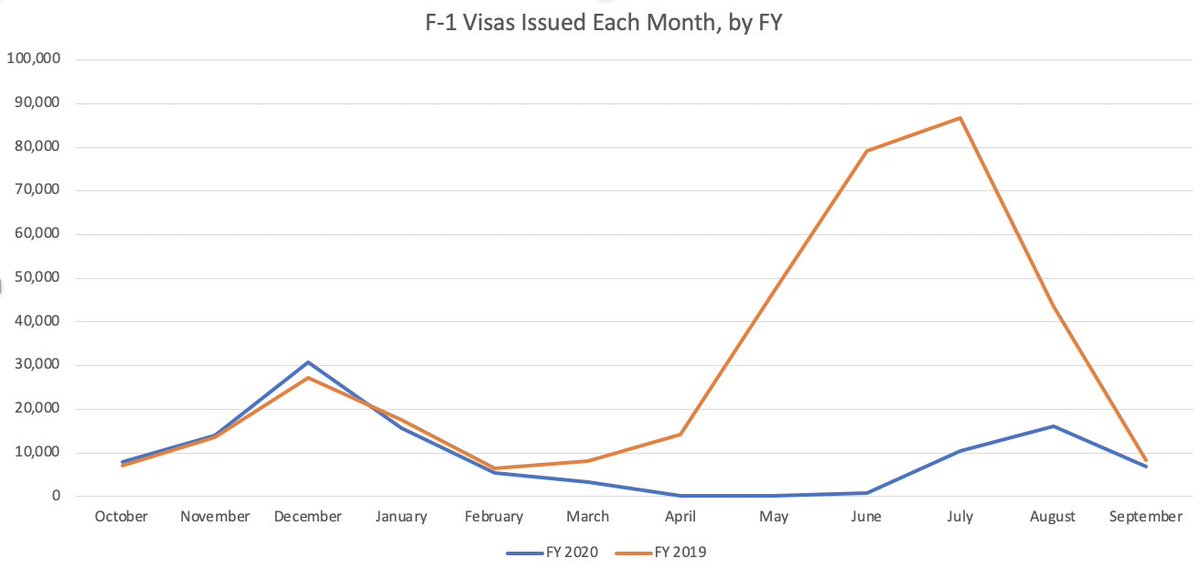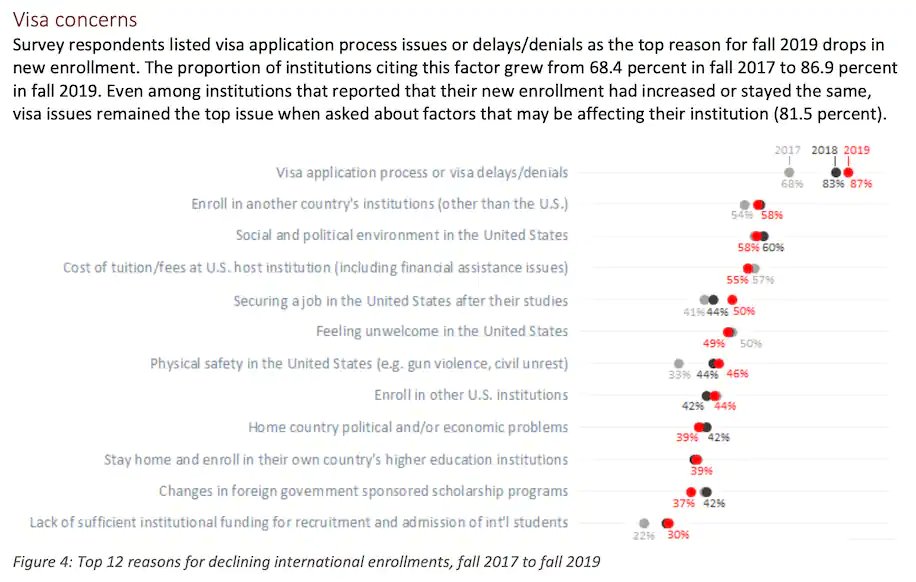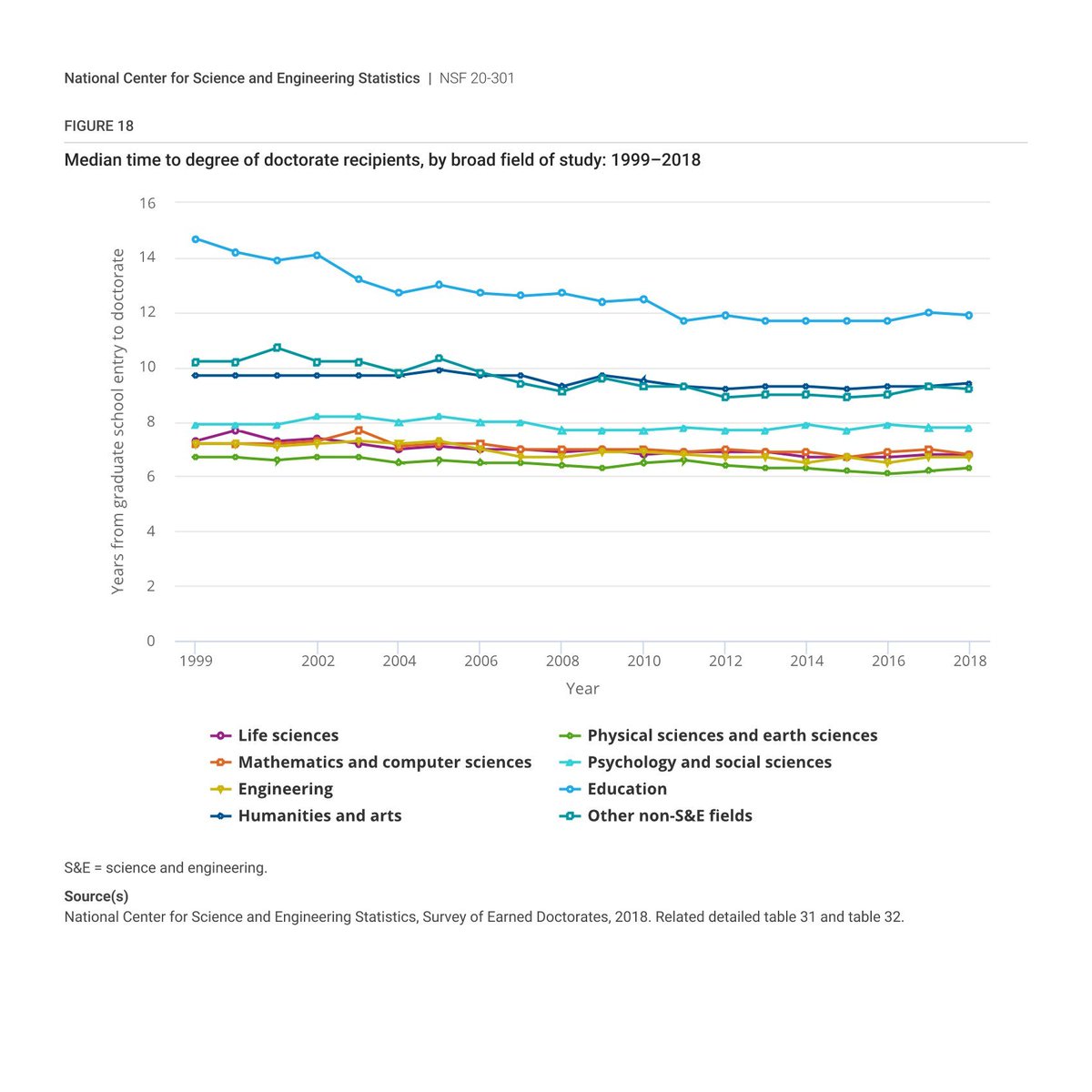So...I just scraped new State Dept data on student visas (F-1& #39;s), and it looks like student visa issuance fell by ~70% from FY2019 to FY2020.
This is an astounding idiotic own-goal for America, given that education is one of our most successful exports.
This is an astounding idiotic own-goal for America, given that education is one of our most successful exports.
What happened? First, covid closed consulates in the spring, and various travel bans then prevented issuance of visas initially for students in some countries even when consulates reopened. Some of that got sorted out eventually. But then...
...Trump admin wouldn& #39;t grant visas to new internat& #39;l students if classes were online, as is the case for many schools during covid. (Initially ICE said even *returning* foreign students wouldn& #39;t be allowed to study here if classes are online, then changed to new students only)
Even before covid, new international student enrollment had been declining -- with schools citing visa problems as a primary reason why (also social/political environment in US, tuition, etc.) https://www.iie.org/Research-and-Insights/Publications/Fall-2019-International-Student-Enrollment-Survey">https://www.iie.org/Research-...
This is a big loss to US. For one, education-related travel is one of America’s most competitive exports, valued at about $44 billion last year. U.S. educational exports were roughly equal to our total exports in soybeans, coal and natural gas — combined. https://www.washingtonpost.com/opinions/2020/07/14/even-with-administrations-about-face-international-student-visas-enrollment-is-still-set-plummet/">https://www.washingtonpost.com/opinions/...
International students are also more likely to pay full, undiscounted tuition. Schools — especially in states where taxpayer funding for public edu has fallen — use this $$ to cross-subsidize their American students. Would be helpful given serious financial strain right now.
International students disproportionately study STEM fields. https://opendoorsdata.org/data/international-students/fields-of-study/">https://opendoorsdata.org/data/inte...
In some STEM PhD programs, more than half of the students come from abroad https://ncses.nsf.gov/pubs/nsb20197/international-s-e-higher-education">https://ncses.nsf.gov/pubs/nsb2...
Traditionally a large share of these international students want to stay after graduation and contribute their skills to the U.S. economy (though getting a work visa has become more difficult). Among doctorate recipients ~70% say they plan to stay https://ncses.nsf.gov/pubs/nsf20301/data-tables/?tableCtr1778">https://ncses.nsf.gov/pubs/nsf2...
These students provide a crucial pipeline of talent to the U.S. tech industry and to America’s R&D infrastructure. There& #39;s a long history of international scientists, for example, helping supercharge U.S. innovation (cc @PMoserEcon) https://papers.ssrn.com/sol3/papers.cfm?abstract_id=1910247">https://papers.ssrn.com/sol3/pape...
Even those who don& #39;t stay still get exposed to American values -- and can be emissaries for American goodwill when they return home. Educating the world& #39;s talent turns out to be a useful soft-power diplomatic tool (as China has learned)
Even when covid ends, international student enrollment is unlikely to fully recover.
The Trump admin announced a new rule last month that limits most student visas to 4 years (2 years, for students from certain countries, predominantly African countries) https://www.insidehighered.com/news/2020/09/25/trump-administration-proposes-major-overhaul-student-visa-rules#:~:text=The%20Trump%20administration%20is%20set,studying%20in%20the%20United%20States.">https://www.insidehighered.com/news/2020...
The Trump admin announced a new rule last month that limits most student visas to 4 years (2 years, for students from certain countries, predominantly African countries) https://www.insidehighered.com/news/2020/09/25/trump-administration-proposes-major-overhaul-student-visa-rules#:~:text=The%20Trump%20administration%20is%20set,studying%20in%20the%20United%20States.">https://www.insidehighered.com/news/2020...
If you& #39;re in a program that takes more than 4 years -- as most STEM PhD program do -- unclear if you& #39;d be able to complete it. You need "compelling academic reasons," which are described as "(i.e., changes of major or research topics, and unexpected research problems)"...
This suggests allowable reasons for an extension involve changes to course of study, not to complete an existing course study that was always expected to take longer than 4 years. Possible other reasons wd be accepted too, but not laid out. In any case creates lots of uncertainty
Would *you* come study here under such conditions, given that Canada and Australia are heavily recruiting international student talent too?

 Read on Twitter
Read on Twitter







